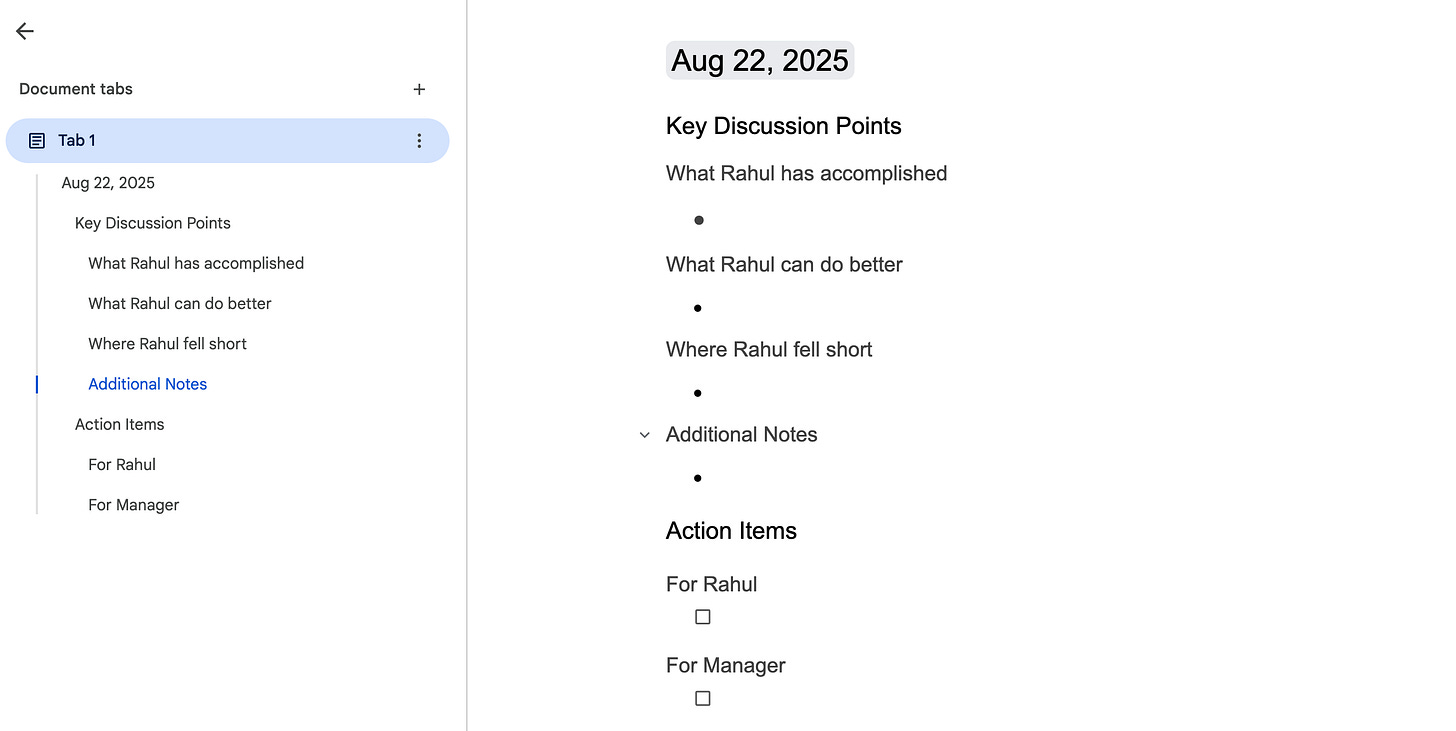Managing Managers: A Skill Everyone Needs
You are the main character in your career journey. It is you, not your manager, who leads your career journey.
Dear Readers,
Most of us will eventually become managers. But all of us, at some point, will have managers.
And here is the tricky part: very few of us actually manage our managers well.
I have worked across startups and large organizations, and one pattern I have noticed is this: talented engineers burn out not because of the work itself, but because their relationship with their manager is misaligned. They either see their manager as an obstacle or as a saviour. Both are flawed mental models.
So let us talk about how to make this relationship work, not by waiting for your manager to magically “get better,” but by learning how to manage up effectively.
Warmly,
~Rahul
In this post
We will talk about:
What your manager is not
When your relationship with your manager feels tough
What a great manager–report relationship looks like
How to think about performance reviews
What you should expect from your manager
How to give feedback to your manager
How I manage sync-ups and alignment with my manager
What your manager is not
When we are new to the workforce, we often put managers into extreme roles.
The executioner.
This is the belief that “If I make a mistake, my manager will punish me, maybe even fire me.” Every interaction feels like walking on eggshells.The saviour.
This is the belief that “My manager will fight for me, protect me, and guarantee my promotion.” Here, we rely on them to make everything better for us.
Both of these mental models are misleading. Why? Because both give away your power.
Yes, your manager has influence. They can promote you, give you challenging opportunities, or if things go badly, let you go. But that doesn’t mean they control your entire career. You do.
Think of it like this: your career is a book, and you are the author. Your manager? At best, they are a key character, sometimes even a co-author of a few chapters. But they are not the hero, and they are not the one holding the pen.
The shift begins when you stop asking, “What will my manager do for me?” and start asking, “What can I do to make this relationship better for both of us?”
When your relationship with your manager feels tough
Maybe your manager doesn’t give you feedback. Maybe they never seem to have time for you. Or maybe you feel like they don’t understand what you are capable of. It happens a lot.
But here is the good news: you can take steps to improve things.
Know what good looks like.
Before fixing to do anything, define what a good end product means to you and the manager. Do you want more context about the work or the strategy? Are the goals clear? Make sure to have an honest feedback loop? Write down everything.Talk about it openly.
Use your 1:1s. Say something like: “Here is the kind of working relationship I would love us to have. For example, I would really appreciate more feedback on my projects. Does that make sense to you?”Be clear about your needs.
Vague complaints don’t help. Instead of “I feel unsupported,” say: “It would help me if I got feedback after the demo, so I know how to improve next time.”Give your manager feedback.
Once a month, tell them what is working. “I appreciated that you gave me context before that meeting, it made me more confident.” Then add what you would like more of.Ask for feedback.
Don’t wait for annual reviews. Simple questions work: “What is one thing I could do differently that would make your job easier?”Escalate if ignored.
If you have given clear, specific feedback several times and nothing changes, it is fair to bring it up with their manager. Do it respectfully and factually.Leave if trust is gone.
If you have tried everything and still don’t trust your manager, it may be time to move on. Don’t let one person is limitations block your career.
What a great manager–report relationship looks like
The best relationships between managers and their team members are built on two things: trust and alignment.
Ask yourself:
Do I trust my manager to do their job well?
Does my manager trust me to do my job well?
If either answer is “not really,” there is probably misalignment.
For example:
You might think your manager is role is to back your ideas.
But your manager might think their role is to challenge your ideas and push for better solutions.
Neither is wrong, but if you don’t talk about it, you will constantly misunderstand each other.
So, ask questions:
“What should I do differently to get more visibility?”
How to give feedback to your manager
Once both of you have laid out your definitions of success, you can co-create a shared vision. This clarity transforms the relationship from transactional (“Do this task”) to collaborative (“Let is make each other successful”).
How to think about performance reviews
Performance reviews often get a bad reputation as judgment days. But if you approach them differently, they can become powerful growth moments.
Celebrate strengths. If your manager praises something, don’t dismiss it. Lean into it. Strengths are often where your biggest opportunities lie.
Over-correct on patterns. If you keep hearing “speak up more in meetings,” don’t just nudge slightly. Set yourself a goal: “I’ll contribute at least three points in every meeting.” It might feel unnatural, but that is often what is needed to shift perception.
Shape your next review. Instead of passively waiting, imagine the review you want six months from now. Do you want to be known as a strong mentor? A clear communicator? Tell your manager: “By the next review, I would love to be recognized for X. Can you help me get there?”
What you should expect from your manager
This isn’t one-sided. Managers owe you certain things. At a minimum, expect them to:
Give you clarity on priorities and goals.
Provide regular, constructive feedback.
Create opportunities for you to grow.
Remove blockers you can’t clear alone.
Advocate for your work when recognition or promotions are on the line.
If they are not doing these things, speak up. It is not disrespectful, it is necessary.
How to give feedback to your manager
This is where most people freeze. But here is the truth: managers need feedback too.
Start with curiosity. Instead of “You don’t support me,” try: “I noticed we don’t often do feedback sessions. Is that intentional? How do you prefer to share feedback?”
Frame it around impact. “When I don’t get feedback after presentations or product demos, I am not sure if I met expectations. It would help me improve faster if you shared your thoughts.”
Be specific. Concrete requests are easier to act on.
Follow up. If things don’t improve, ask again: “I wanted to check if the changes we discussed are working for you as well.”
Escalate respectfully. If nothing changes, involve their manager with facts, not emotions.
Giving feedback to your manager is not rebellion — it is leadership.
How I manage sync-ups and alignment with my manager
A strong manager–report relationship doesn’t just happen in performance reviews. It is built in the small, consistent ways you communicate. Here is what works for me:
1. Biweekly 1:1s with structure
I keep a simple structure for my one-on-ones so that both of us walk away with clarity:
20%: What I have accomplished
20%: What I can do better
20%: Where I fell short
40%: Action items
50% on me
50% on my manager
This balance makes the conversation honest, forward-looking, and accountable on both sides. It is not just me reporting status. It is us aligning and committing to actions together
2. Dedicated Slack channels for visibility
I use Slack heavily to reduce back-and-forth and increase transparency. For each project, I create dedicated channels that include my manager and my team. We use them for:
Design discussions
Deliverables and sign-offs
Roadblocks and clarifications
This ensures my manager always has visibility into the work, without needing to chase me for updates. One principle I live by: your manager should already know the state of your work before they ask.
This combination of structured sync-ups and transparent async updates creates trust, alignment, and accountability.




